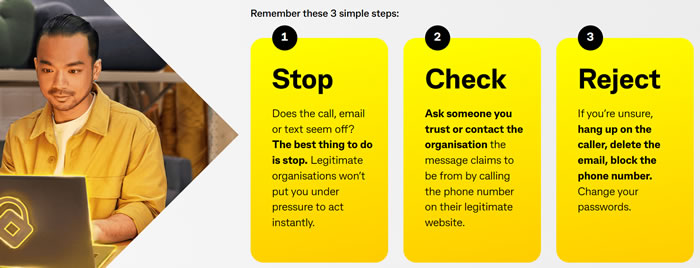Scam Alert: Does a call, email or text seem 'not quite right' ? |

Scams may come from various sources: an anonymous call, a deceptive advertisement on social media, a seemingly credible text message, or even a fraudulent email in your inbox.
The need for collective community effort to combat these scams has never been more critical.
Does a call, email or text seem off?
Remember these 3 simple steps:
Stop
Does the call, email or text seem off? The best thing to do is stop. Legitimate organisations won't put you under pressure to act instantly.
Check
Ask someone you trust or contact the organisation the message claims to be from by calling the phone number on their legitimate website.
Reject
If you're unsure, hang up on the caller, delete the email, block the phone number. Change your passwords.
Think you may be dealing with a scam?
Remember, banks will never:
 Ask you to share your passwords, one-time codes or token codes
Ask you to share your passwords, one-time codes or token codes Ask you to download or install software
Ask you to download or install software Request remote access to your computer
Request remote access to your computerYou can report suspicious emails or texts direct to your bank then delete them straight after.
Don't reply or engage with them.
❊ Web Links ❊
➼ Scam Alert: Does a call, email or text seem 'not quite right' ?
➼ Source content: smh.com.au
➼ www.scamwatch.gov.au
➼ www.acma.gov.au
➼ Protect Your Financial Identity
➼ www.staysmartonline.gov.au
➼ Australian Securities & Investments Commission (ASIC)
➼ Australian Federal Police
➼ www.counterfraud.gov.au
❊ Also See.. ❊
➼ Scamwatch
Update Page






